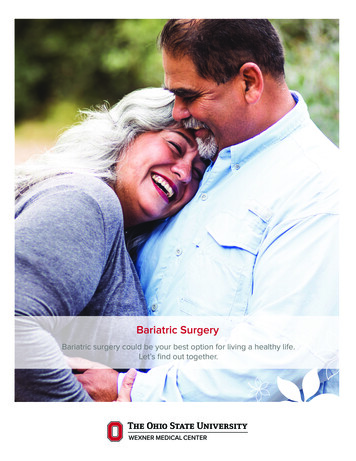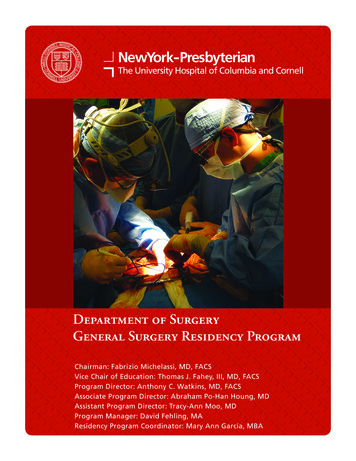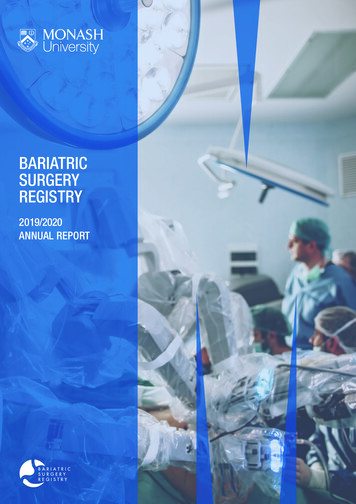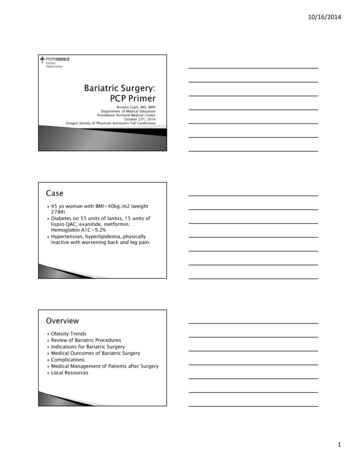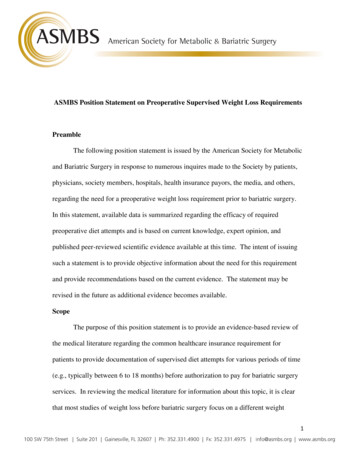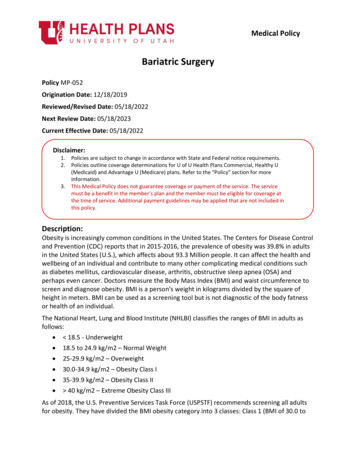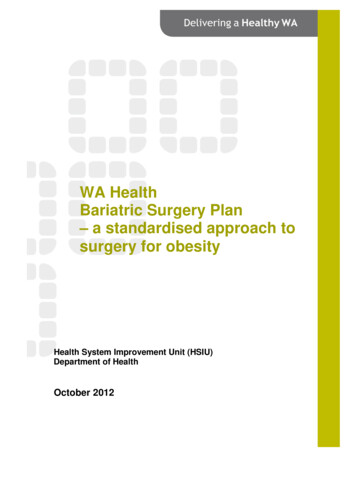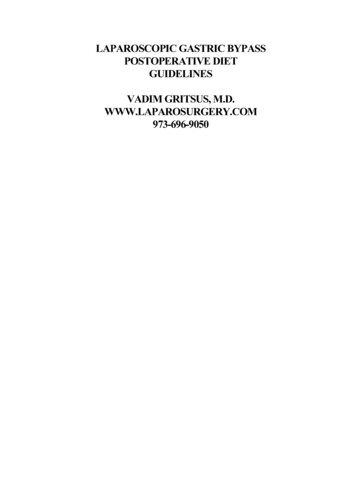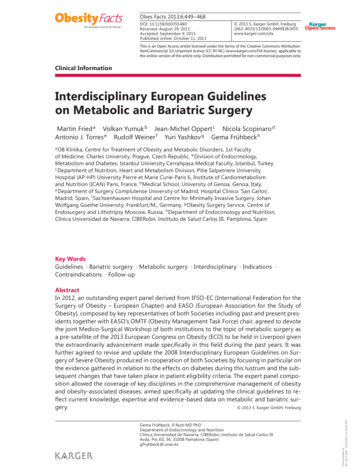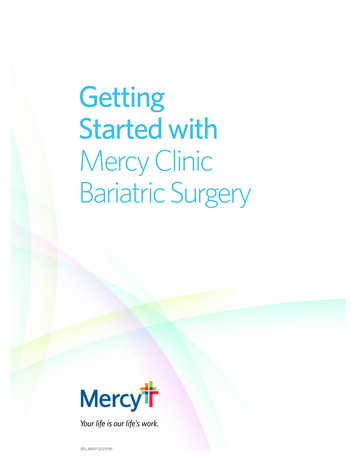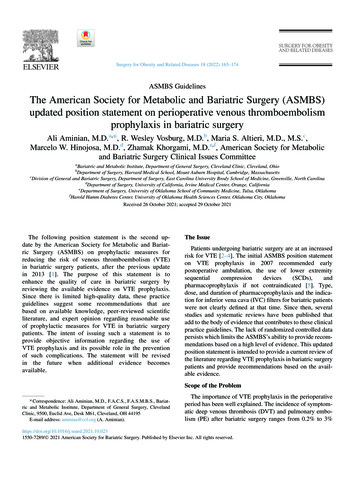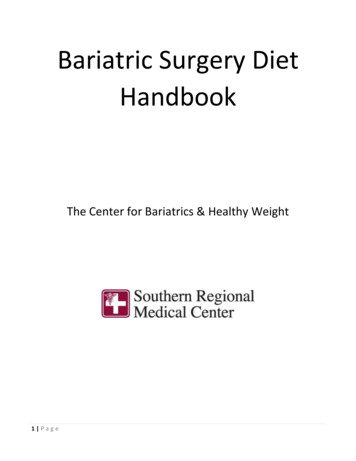
Transcription
Bariatric Surgery DietHandbookThe Center for Bariatrics & Healthy Weight1 Page
Table of ContentsPreparing for Weight Loss Surgery3Two-Day Clear Liquid Diet Prior to Surgery4How to Advance Diet Following SurgeryTips for Recovering After SurgeryProtein and Its Importance4-78-1112-14Reducing your Carbohydrates15Food Label Information16Guidelines for Food Selection17-18Recommended Vitamin Regimen19-21How to Achieve Long-Term Success22-23Follow-up2 Page24
Preparing for Weight Loss SurgeryPre-Operative PreparationIn anticipation of bariatric surgery, preparation includes several steps to optimize overallhealth and to begin the process of making new life style behavior modifications. Stop drinking all carbonated beveragesStop drinking all beverages that contain caffeineBegin a regular exercise routine (consult with physician first)Begin cutting food into small pieces and practice chewing very well (15-20 timesper bite) Join our support group, “The Wellness Weigh”Begin the practice of not drinking with your meals. Stop drinking 30 minutes before youeat and wait at least 30 minutes after the meal is finished. This will be necessary afteryour surgery and needs to become a life-long habit.Have your prescribing physician convert all your time-released or extended-releasemedication to non-time released formulations. If you are unsure about a medication,please contact your pharmacist or prescribing physician.What to Expect After SurgeryIt is very important to follow the eating and drinking instructions starting right after theoperation to allow the new stomach to heal completely and in the right position.You will notice a difference in the amount and type of food you can eat. You will receivenutritional counseling to help show you the do’s and don’ts. Since the amount of foodyou can eat will be much less, it becomes very important to eat the right types of foodto be sure your body is meeting the appropriate nutritional requirements.It is reasonable to expect to lose 60-100lbs in the first year depending on yourprocedure and how much excess weight you had before surgery. Most people willstabilize at their new weight 2 years after surgery.3 Page
2-Day Liquid Diet Prior to SurgeryIn the two days prior to surgery you will be on a clear liquid diet ONLY. This will include:Apple or other clear juice (pulp free)Clear broth (chicken, vegetable, orbeef)Jell-O (any color)Popsicles (sugar free)Water or flavored water productsProtein drinksLow fat / skim milkNO SOLID FOODStrict adherence to this diet is important to reduce potential complications associatedwith bariatric surgery. This 2-day liquid diet helps to ensure there is no solid food in yourstomach at the time of surgery, and will also will help reduce the size of your liver,making it easier for the surgeon to complete your surgery efficiently and effectively.Advancing Your Diet after Bariatric SurgeryStage 1- Week 1: Clear Liquid DietClear Liquid Diet will begin post-op Day 1 if no nausea or vomiting occurs.You must sip fluids all day. The goal should be 4-8 ounces per hour for a total of atleast 64 ounces of clear liquids per day.Recommended Sugar-Free Clear Liquids: Clear broth or bouillon – Chicken, Beef, or Vegetable. You may add proteinpowder if you wish. Crystal Light or sugar-free Kool-Aid Decaf tea and coffee (NutraSweet, Splenda, Stevia, non-dairy creamer areallowed) Fruit juice. Avoid citrus (orange, grapefruit, and pineapple) and tomato. Grape,apple, and cranberry are acceptable choices. These beverages should contain lessthan 5 grams of sugar per serving. Herbal tea, or un-sweet tea – caffeine free Jello NO carbonated beverages Propel Water, low calorie Gatorade (G2), or Powerade Zero4 Page
Sugar-free Carnation Instant Breakfast Sugar – free popsicles, Sugar-free Italian Ice WaterStart your vitamins once you get home.Stage 2 – Week 2: Full Liquid DietStart high protein full liquids (Pro-complex, Body Fortress, etc.) in addition to sugar-freeclear liquids.Recommended Foods: All food from previous stages If protein powder with clear liquid is tolerated, then mix protein powder of choicewith non-fat milk or Almond Milk. If lactose intolerant, use non-fat LactaseEnzyme treated milk Low Fat creamed soups – thinned (no chunks). Check useful websites for recipes Natural applesauce Non-fat yogurt (sugar-free) with less than 60 calories and 8 grams of sugar perserving Sugar-free pudding – make with skim milk and add protein power Unsweetened 100% fruit juice diluted with water without pulp (no orange juice,grapefruit or tomato juice). Limit to 4 ounces per day Protein shakes – drink up to half of the shake at a time5 Page
Stage 3 – Week 3: Pureed Diet to Soft DietPureed Diet to Soft Diet Continue full liquids, and transition to pureed foods by adding one new food at atime, as tolerated Aim for 48-64 ounces of fluid per day to prevent dehydration. Avoid drinking 30minutes before and after meals Chew completely and slowly Eat 3 meals a day and 2 snacks Limit fats and avoid sugars Protein is the priority (70-80 gm per day)Recommended Foods: All foods from previous stagesBlended protein shakes with non-fat, sugar-free frozen yogurt, pureed fruitCanned peaches, apricots, mandarin oranges or pearsDried beans and peas, navy beans, kidney beans, low fat refried pinto beans, limabeans, lentils, split peas cooked without added fat until very tender (rememberthat these foods may cause abdominal discomfort and/or gas)Eggs, scrambled or egg whitesHummusLean meats (fish, tuna fish, chicken, turkey) make sure the meats are moist andchewed well before swallowingLow fat cheese containing less than 6 gm of fat per ounce (most 2% cheese), lowfat or non-fat cottage cheese (1/4 cup), ricotta cheeseTuna fish made with low fat mayoCanned salmon without skin, ground turkey, ground chickenSoft cooked vegetables such as green beans, zucchini, squash (should be mushybefore swallowing)6 Page
Stage 4 – Week 4: Add new foods one at a timeSOFT TO REGULAR DIET Aim for 64 ounces of fluids to prevent dehydration. Avoid drinking 30 minutesbefore and after meals Continue drinking fluids especially water between meals and throughout the day 3 meals a day, plus 2 snacks if needed. No more than 2 oz of meat and 1 oz ofother food for the meal. 1-2 oz for snacksRECOMMENDED FOODS: All foods from the previous stagesAvoid fibrous vegetables (raw cabbage, celery)Avoid fruit with membranes (oranges, grapefruit, pineapple, grapes)Avoid tough meats (steak, roast, pork chops)Cheese containing less than 5 gm of fat per ounce (most 2% cheese), LaughingCow cheese, cheese sticksDried beans and peas – navy beans, kidney beans, low fat refried pinto beans,lima beans, lentils, split peas cooked without added fat until very tender(remember that these foods may cause abdominal discomfort and/or gas)Lean meats (fish, tuna, chicken, turkey) make sure the meats are moist andchewed well before swallowingLow fat or non-fat cottage cheese (1/4 cup)Soft cooked vegetablesRemember Add one new food at a timeAvoid starchy foods like rice, pasta, breads, potatoesChew completely and slowlyContinue supplemental protein (70-80 gm of protein is the daily goal)You are recommended to avoid the following foods for the long term: Foods high in carbohydrates: (Pasta, rice, breads, crackers, white potatoes,macaroni & cheese, oatmeal, grits, sweets) Foods high in saturated fats and avoid trans fats7 Page
Tips for Recovering after SurgeryWhat do I do if it feels like food is “stuck?”When food is not passing through your pouch or sleeve, you may experience any or allof the following: Excessive Salivation (frothing)HeartburnNauseaCrampingVomiting / dry heavesPainThirstIf this happens, take the following steps to alleviate the discomfort as quickly aspossible: RELAX! Stress will only increase the discomfort. Lay down if possible. Don’t eat anything. Drink sips of water. Warm liquids can sometimes help to relaxthe stomach better than cold fluids. Stay on liquids for several hours.** IF YOU CANNOT TAKE IN LIQUIDS FOR 24 HOURS, PLEASE CONTACT THE OFFICE FORFURTHER ADVICE**“Did I chew my food well? Did I take too big of a bite? Did I eat too fast?”If you do not chew your food well enough, the bites you swallow will be too large topass easily through your gastric pouch of sleeved stomach. The un-chewed bites willnot be able to continue to go down and are more likely to cause discomfort. Your foodshould be cut to the size of your ‘pinky’ nail to be small enough.Be careful with fibrous food.Although you will learn fiber is good for you, food that contains many fibers, such asasparagus or celery, can cause the food to become stuck. This can happen when food is8 Page
not chewed well enough to break it up into small pieces and your saliva cannot break itdown. If you would like to eat fibrous foods occasionally, be sure to cook them well, cutinto very small pieces, and chew thoroughly.Nausea and vomitingIt is very common for post-operative patients to feel nauseated during the first fewmonths. If this nausea causes frequent vomiting, it is important to call or visit the officeto see if any treatment or testing needs to be done.When you feel full, stop eating and put the food away. Don’t pick at it if you are still atthe table. A meal should not take longer than 20 minutes to finish. If it is taking longer,you are probably waiting too long between bites, or getting full and waiting for it to passthrough to give you more room to continue eating. The goal is not to finish your meal; itis to learn what full means and feels like.One of the causes of nausea and vomiting is noncompliance with nutritional guidelines.Hence, it is vital to follow the provided guidelines.Any problems with nausea or vomiting should prompt the following questions andnecessary changes to avoid further pain and discomfort: How long am I taking to eat and/or drink?Did I drink fluids with my meal or too soon before/after the meal?Am I eating more than I should?Am I chewing solid foods until they resemble a pureed consistency?Did I lie down too soon after my meal?Did I eat hard-to-digest foods such as tough meat or fresh bread?Did I eat foods from the next stage of the menu plan before being cleared by thephysician to do so?** IF VOMITING PERSISTS THROUGHOUT THE DAY, DO NOT EAT SOLID FOODS. SIP ONCLEAR LIQUIDS (STAGE 1). IF VOMITNG OCCURS FOR MORE THAN 24 HOURS, CONTACTTHE OFFICE IMMEDIATELY.**9 Page
FrothingAs the new gastric pouch or sleeved stomach heals, mucous is excreted to help breakdown food. At times, it is common for the mucous to back up in the esophagus andcause frothy clear vomiting. This is typically short lived and usually resolves by the 3rdmonth. Frothing is not a complication, so try to drink warm water 30 minutes prior toyour meal to help break down the mucous. This should help to better tolerate yourmeals.Gas PainsGas pains are common in the first few weeks after surgery. Sometimes these pains canbe severe and more uncomfortable than the ‘surgical’ pain. To help relieve these pains,try to increase activity level to include consistent walking. You can also try anti-gas overthe counter medications that contain simethicone. Examples include Mylanta, Maalox,Gaviscon, Gas X.Gas pains or spasms may occur months or even years after your bariatric surgery. Thecause for random episodes is often unknown, and this discomfort will usually relieveitself after a short time. If the discomfort from gas or spasms persists, contact yoursurgeon for evaluation and possible treatment with medication to relax the intestine.Hair LossIf you notice hair loss/thinning, especially around the third month after surgery, youshould consult with the dietitian to help increase your protein intake. Hair loss is oftenattributable to protein deficiencies. Increasing your protein intake may help to reducehair loss. There are no ‘guarantees’, however. Hair regrowth frequently occurs afterseveral months. We recommend increasing protein to 80gm daily. Adding Biotin mayalso help, as it is a vitamin specifically designed to increase hair/nail strength andgrowth.Bowel HabitsIt is common to have some temporary bowel changes. These changes range fromconstipation to diarrhea. If you do not move your bowels by the fourth day at home,you may try a mild laxative such as Milk of Magnesia. Follow the bottle instructions.Maroon or blood tinged stools should be reported to your surgeon, as this may indicateneed for testing and or medications to reduce ulcer formation. Please note it is common10 P a g e
for the first one or two bowel movements after surgery to have a small amount of blooddue to the recent surgery. Please contact the office if it persists.ConstipationAfter surgery, constipation is common. Remember food intake is very small comparedto before surgery. As a result, bowel movements will be decreased. Many peoplereport having a bowel movement every 2-3 days. If stools are hard, be sure to drink anadequate amount of fluid daily (48-64 ounces). Also, when appropriate, include morefiber-containing foods in the meal plans such as oatmeal, bananas, fruits, and fiberproducts. You may also try Smooth Move Tea, Apricot or Prune juice (unsweetened),Milk of Magnesia, or Miralax.DiarrheaImmediately following surgery, there may be bouts of diarrhea. This should betemporary. If the diarrhea occurs more than 3 times in a day, you may take Imodium orother over the counter equivalent. If it is not possible to maintain adequate hydrationdue to persistent diarrhea, contact the office.If constipation, bloating or diarrhea occurs for a prolonged period, it may be helpful totry taking a daily probiotic. Probiotics are naturally occurring ‘good’ bacteria that live inour gastrointestinal tracts. After surgery or with the use of antibiotics, this sensitivebalance of good bacteria can be altered allowing the ‘bad’ bacteria to take over.Probiotics from foods and supplements can play a role in helping restore this balanceand alleviating symptoms of gas, bloating, diarrhea, and constipation. They areavailable over the counter at most grocery and drug stores, and online.Dumping SyndromeDumping syndrome occurs when the undigested food from your stomach moves rapidlyinto your intestines. This is most common after procedures that involve bypassing someof the intestine, such as gastric bypass or duodenal switch. Usual symptoms includeabdominal cramping, nausea, diarrhea, hot flashes, or dizziness. Symptoms can startimmediately after eating or 1-3 hours later. Dumping syndrome commonly occurs aftereating foods that are high in carbohydrates and sugar. Dumping syndrome is typicallymanaged by adjusting your diet.11 P a g e
Alcohol ConsumptionAfter bariatric surgery, you will feel the effects of alcohol much faster. Blood alcohollevels peak higher and take longer to return to normal due to altered metabolism afterbariatric surgery. Avoid alcohol for the first 6 months after surgery. When drinking, remember that small amounts of alcohol can cause intoxicationor can result in low blood glucose with serious consequences. When you get permission to start drinking alcohol again, avoid carbonatedbeverages and sugary drink mixers. Never drink and drive, even after consuming only minimal amounts of alcohol. Be aware of the calorie content of alcohol. If you find yourself drinking regularly to cope with emotions or stress, seek helpby consulting with your primary care doctor.Why is Protein so Important? Protein aids in proper wound healing after bariatric surgery.Protein helps keep hair, skin, nails, and bones healthy.Protein helps your body burn fat instead of muscle for a healthier weight loss.Protein helps build muscle which leads to quicker weight loss. Remember, themore muscle you have, the faster your metabolism becomes, and the morecalories from fat you will burn. Protein triggers the fat burning hormones in your body. Protein stimulates therelease of glucagon which is a hormone that allows you to utilize your stored fat. Protein curbs your hunger between meals to help you avoid ‘snackingtemptation’. Protein allows you to feel full for a longer period of time.Protein and your meals: Eat all your protein foods first, and then move on to your vegetables and fruits. Half of your meal size should consist of protein.12 P a g e
Try to have protein as part of every meal.Protein rich foods: Eggs, fish, chicken, turkey, tofu, shrimp. Try to choose white meat poultry. Nuts,beans, non-fat/low-fat cottage cheese, cheese, plain or sweetened low carb, nonfat/low-fat yogurt, lactaid milk.How Do I Get the Recommended Amount of Protein I Need?It is recommended that you get an average of 60-80 gm of protein daily. This should bebroken up into 3 meals and 2 snacks.You can determine the protein amount withpackaged/labeled foods, but food withoutlabels can be tricky.See below for a helpful explanation forprotein content: Ounce of protein 7 grams of protein 1 egg 6-7 grams of protein 3 oz serving of protein 21 grams ofproteino Size of the palm of your handor a deck of cards Greek yogurto Dannon Light and Fit 6 oz 12 grams of proteino Yoplait: 1 container 11 grams of proteino Chobani: 6 oz 14 grams of proteinMeal Replacement Protein ShakesMust Contain: Whey Protein – main protein source – within first 2 ingredients High Protein level – 20 grams per serving13 P a g e
Low Calorie – 80-120 calories per serving Low Sugar – less than 8 grams per serving When mixing powders: Mix with either water, milk (skim, 1%, almond, soy), 100%juice, diet (sugar-free juice). You may also add yogurt and fresh/frozen fruit tothem to make smoothies. **Be sure to add the calories and carbs of any addedingredients to the overall total count of the shake**Examples of Protein Supplement Brands:UnjuryPure Unflavored ProteinIsolatePure ProteinIsopure Protein ZeroEAS AdvantEdge CarbControlAtkinsClick Protein14 P a g eBody By ViGNC Pro Performance100% Whey ProteinWhey Bolic Extreme 60CytoSport Whey ProteinBluebonnett WheyProteinSyntrax InnovationsNectarCore ProteinGNC – Lean ProteinEAS Whey ProteinPowder (Lean 15)GlucernaMuscle MilkPremiere ProteinBody Fortress
Why should Carbohydrates be Reduced?Carbohydrates activate the fat storing hormones in your body Once you consume foods that are high in carbohydrates and sugar, your bloodsugar becomes elevated. Your body naturally makes insulin to regulate yourblood sugar. However, insulin is a fat storing hormone and has a negative effecton weight loss. Once insulin levels are elevated, your body will store morecalories that you eat as fat for the next 24 hours.Eating too many carbohydrates will make your portions larger Carbohydrates pass through your gastric pouch, or sleeved stomach and into yourintestines much quicker than protein. This makes room for more food, ultimatelymaking your portions larger. Because carbs don’t stay in your stomach for a longtime, you will start to feel hungry sooner than you should.BUT, Carbohydrates provide important Fiber Not all carbohydrates are bad. Complex carbs such as beans, fruits andvegetables are encouraged. These foods contain more fiber than sugar. Fibercounteracts the body’s insulin response to sugar and can activate fat burninghormones. Fiber is also vital in controlling hunger and decreasing cravings.Carbohydrates to AvoidBread, rice, pasta, oatmeal, grits, cream of wheat, crackers, chips, macaroni & cheese,juices, sweet tea, soda, potatoes, bagels, pancakes, cereal, tortilla, cookies, cakes,candy Please keep in mind this is a list of some of the carbohydrates to be mindful oflimiting in your diet. You will not be required to be on a zero-carb diet for the restof your life; however, there are carbs in foods that do not look like classiccarbohydrates. By consciously staying away from the obvious carbs, you canleave room for the hidden carbohydrates that will be in your fruits, vegetables,drinks and condiments.15 P a g e
Food LabelsRead all your food labels to determine the nutrient content and be on the lookout forhidden sugars. Serving size is important!Be careful when reading labels at the market. Quoted protein amounts are based oncertain serving sizes and you may not be able to have a whole serving. * A product thatappears high in protein, may not be all that high. *Check the amounts of other nutrients as well. A food high in protein, but also high incarbohydrates or fats would not be as good of a choice as the proportion of protein isnot as good as it may seem.Choose foods that contain: Less than 10 grams of totalcarbohydrates per serving Less than 5 grams of sugar per serving Aim for more fiber than sugarYour carbohydrate intake should contain lessthan 40-50 grams per day.Your sugar intake should be less than 20grams per day.16 P a g e
Guidelines for Food Selection After Bariatric SurgeryThe following list is to be used as a guide for making food selections.Always work toward eating a low-carb, high protein diet.ProteinBreads,Potatoes andStarchSubstitutesVegetablesFruits17 P a g eFOODS RECOMMENDEDEggs, fish, chicken, turkey,tofu, shrimp. Try to choosewhite meat poultry. Iftolerated, non-fat/low-fatcottage cheese, cheese, plainor sweetened low carb nonfat/low-fat yogurt, LactaidmilkGreen peasBeans and lentils, howeverthey may cause discomfortand gas.MAY CAUSE DISTRESSFried or high fat meats, friedeggs, highly seasoned or spicymeats, skin of meats andtough meats. Avoid beef,lamb, pork during the first 3months. After 3 months, addto diet as tolerated.Breads made with dried fruits,nuts and seeds, pastries,donuts, muffins, past and riceif not fully cooked, sugarcoated cereals, coarse brancereals.Soft cooked fresh, frozen orAny vegetable with tough skincanned vegetables ( i.e.,or seeds (i.e., tomato, corn,carrots, beets, mushrooms,celery). Cabbage, cauliflower,spinach, squash, green beans), broccoli, and brussel sproutsvegetable juice, and rawmay cause gas.vegetables as tolerated afterseveral months.Strawberries, raspberries,High carb fruit juices/drinks,blueberries, blackberries,fruit skins, fruits canned inapple slices, pear slicesheavy syrup. Dried fruits,pineapple, and melons. Forsome raw apples may causegas.
SoupsFatsSweetsBeveragesProtein soups made withallowed foods, spicy soups astolerated. While restricted onliquids with meals, strain anddrink liquid from soup only.Small amounts of butter or oilmay be used, low-fat saladdressings, non-fat/low-fatmayonnaise, sour cream andcream cheese as tolerated.Peanut butter in smallamounts.Not recommended. See‘dumping syndrome’explanationSoups prepared with heavycream or made with high fatingredients.Regular mayonnaise, saladdressing, margarine butter andsour cream in large amounts.All sweets, candies anddesserts especially if madewith chocolate or dried fruitsor if eaten on an emptystomach.Alcohol, sweetened fruit drinksor carbonated regular soda.Decaffeinated coffee, unsweet tea, water, nonfat/low-fat Lactaid milk,Crystal Light.Miscellaneous Iodized salt, pepper, herbsJalapenos, nuts, seeds, toughand flavored seasonings asskins for at least 3 monthstolerated. Light mocha mix or post-op.other nondairy low-fatsubstitutes.18 P a g e
The Importance of VitaminsAfter your surgery, it is very important that you continue to take vitamins daily asdirected by your health care provider. Every vitamin that you are directed to take isessential for your overall health and wellbeing.VitaminCalciumVitamin DVitamin B12IronB complex (B1 and B6)Functional useMaintains bone strengthand helps prevent bonefracturesAids with calciumabsorptionWithout it Increased risk of bonefracture andosteoporosisIncreased fatigue, mayhave tingling and jointpainSupports the nervousMay have memory loss,systemnumbness, tingling,paralysisHelps oxygen throughout Tiredness and lack ofthe bodyenergy. Increased risk ofanemia and heart attackSupports metabolismMay have memory loss,numbness, tingling,paralysisYou will not be able to obtain all recommended vitamins in a singlemultivitamin To minimize the number of pills taken, start with a multivitamin that contains theappropriate amount of iron and B vitamins. You will need to take additionalcalcium and vitamin D. The calcium and Vitamin D in the multivitamin will likelynot be enough. A prescription is not needed for vitamins. They can be purchased over the counteror online. You will not be able to swallow whole pills for 6 weeks. The recommended formsduring this period are liquid, chewable, dissolvable, nasal spray, and injectable.19 P a g e
Patches are not recommended as first line because their absorption is notconsistent. After 6 weeks you will be able to swallow pills no larger than the size of a plainM&M. That may require larger pills to be crushed or broken in half. Your levels will be checked with blood work done at 6 weeks, and then every 6months to a year after surgery. Individual recommendations may be made based on your lab results.Recommended Vitamin RegimenVitaminMultivitamin*Mandatory after Gastric Bypass andDosage Options200% RDA (Recommended Daily Allowance)-Take 1-2 multivitamins dailyGastric SleeveVitamin B12 (Cobalamin)-500 mcg or more every day by mouth*Mandatory after Gastric Bypass-1000 mcg every 2-4 weeks by injectionCalcium Vitamin D1,500 – 2,000 mg Calcium/day 5,000 IU*Caffeinated products, spinach, andVitamin Dwhole grain products may decrease-Divide into 2-3 doses each day and pair withthe absorption of these two nutrients.mealsTo get the best rate of absorption,-Choose a brand that includes Calcium Citratetake at least 1-2 hours before or afterand Vitamin D3. The citrate form of Calcium isiron, since calcium will decrease ironbetter absorbed because it doesn’t require theabsorption.*Mandatory after Gastric Bypass andGastric Sleeve20 P a g eacid from your stomach to be absorbed.
Iron100% RDA (Recommended Daily Allowance)*Take 1-2 hours before or after-Ferrous Sulfate: 325 mg/dayCalcium. Do not take with milk,-Ferrous Gluconate: 325 mg/daycheese, eggs, whole grain breads and-Elemental Iron: 18-27 mg/daycereals.*Mandatory after Gastric BypassB Complex (B1 and B6)10 – 20 mg/day*OptionalZinc*Optional21 P a g e8 – 22 mg/day
Helpful Rules to Effective Weight LossIt is important to understand that weight loss should be gradual, sustained, andaccompanied by careful attention to proper nutrition. Understand that you are notalone, and we are here to help you overcome this disease and put you on the track of ahealthy life.Rule 1: Eat 3 small meals and 2 snacks per dayThe fewer meals you eat, the less your body will want to burn fat in an attempt to storeenergy for future use. Avoid skipping meals, especially breakfast. Breakfast is the mostimportant meal of the day and should be consumed within the first 2 hours afterwaking. Breakfast helps regulate stress hormones that control hunger. Skippingbreakfast will lead to increased cravings, hunger and dips in energy throughout the day.Rule 2: Stop eating as soon as you get a feeling of being satisfiedThis is a tough one. Once your stomach is getting full, your body receives a signal thatyou have eaten enough. It takes time, though for you to become aware of this signal. Ifyou rush through your meal, you may eat more than you need. This can lead to nauseaand vomiting and stretching of the gastric pouch or sleeve. Take time to enjoy everybite of your meal. Learn to recognize the feeling of satisfaction, then stop eating atonce. If you try to eat until you are full, you may be eating too much and stretch yournew stomach. In the long run, this could lead to eating more than you should on aregular basis.Rule 3: Do not drink while you are eatingBariatric surgery works best if you do not drink your calories and eat solid food duringyour three meals. You should not drink anything for 30 minutes after a meal. Thisallows you to keep the feeling of fullness as long as possible. Eating and drinking at thesame time may stretch your new stomach.Rule 4: Eat only good quality, nutritious foodWith bariatric surgery, you should be able to eat only small amounts so the food you eatshould be as nutritious as possible. Follow the nutrition guidelines and instructionsfrom our medical providers and dietitian. We prefer you eat predominantly protein andvegetables. A snack, if necessary, should be fruit, nuts, or low-fat cheese sticks. Wewant you to limit the carbohydrates as much as possible (oatmeal, grits, rice, mashed22 P a g e
potatoes, fries, macaroni & cheese, breads, ect.), and of course the sweets found indeserts and candy. JUST SAY NO!!Rule 5: Drink enough fluids during the dayDrinking enough fluids is essential for staying hydrated and for flushing waste productsout of your body. Individual needs will vary, but you should drink at least 6-8 glasses ofliquid a day. Remember: Drink only non-carbonated/zero calorie liquids. Water ispreferred. Remember to keep your food and drinks separate during the day. To avoiddehydration:SIP, SIP, SIP all day long!!! TIP: room temperature liquids are usually tolerated better Avoid drinking straws Avoid carbonationRule 6: Avoid foods that increase hunger and cravingsCoffee, artificial sweeteners, and sweet snack foods affect stress hormones and insulinlevels which can increase hunger. Choose water, green tea and snacks that containprotein and fiber (fruits and vegetables) instead.23 P a g e
Follow-Up:We are here to help you every step of the way on your weight loss journey. If you haveany questions, please contact the office.Southern Regional Medical CenterThe Center for Bariatrics & Healthy Weight11 Upper Riverdale Rd., SWSurgery Suites – Ground floor of Women’s CenterRiverdale, GA 30274Office: 770-897-SLIM (7546)24 P a g e
with bariatric surgery. This 2-day liquid diet helps to ensure there is no solid food in your stomach at the time of surgery, and will also will help reduce the size of your liver, making it easier for the surgeon to complete your surgery efficiently and effectively. Advancing Your Diet after Bariatric Surgery Stage 1- Week 1: Clear Liquid Diet
